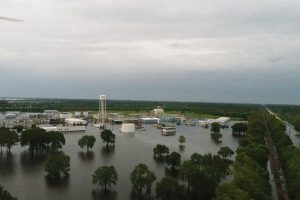 The Department of Labor yesterday announced a number of initiatives to address the impact of Hurricane Harvey. Among those was an announcement that OSHA will cease conducting programmed enforcement actions in the affected areas to avoid disrupting recovery operations. This makes sense, sort of. “Programmed inspections” are “optional,” to the extent they are not legally required “unprogrammed” inspections that result from fatalities, catastrophes, worker complaints or referrals. Clearly OSHA’s immediate priority in the Houston area will be to ensure the safety of responders and recovery workers. OSHA is currently conducting a chemical industry “National Emphasis Program” where the agency focuses “programmed inspections” on chemical facilities to ensure that they are operating safely and in compliance with OSHA standards. These inspections would presumably cease in the affected area during the recovery period.
The Department of Labor yesterday announced a number of initiatives to address the impact of Hurricane Harvey. Among those was an announcement that OSHA will cease conducting programmed enforcement actions in the affected areas to avoid disrupting recovery operations. This makes sense, sort of. “Programmed inspections” are “optional,” to the extent they are not legally required “unprogrammed” inspections that result from fatalities, catastrophes, worker complaints or referrals. Clearly OSHA’s immediate priority in the Houston area will be to ensure the safety of responders and recovery workers. OSHA is currently conducting a chemical industry “National Emphasis Program” where the agency focuses “programmed inspections” on chemical facilities to ensure that they are operating safely and in compliance with OSHA standards. These inspections would presumably cease in the affected area during the recovery period.
Again, this is common OSHA practice during disasters and makes sense — to a certain extent.
The reason for my hesitation is that over the next few weeks, all of the 2500 refineries and chemical facilities in the Houston area that shut down due to Hurricane Harvey will be starting up again. Starting up units in refineries and chemical facilities after they’ve been shut down is the most hazardous period of any refinery or chemical plant operation, where the danger of uncontrolled releases and explosions is greatest. (Shutdowns and startups also significantly increase the amount of pollutants released into the air.)
And that’s under normal circumstances, such as a “turnaround” which is a scheduled shutdown of a process unit for an extended period of time in order to revamp the unit, perform maintenance, replace worn out valves and equipment, etc. The start-ups we’ll be seeing over the next few weeks will be anything but normal. Many of these facilities have seen levels of flooding and water that no one has ever experienced before — and therefore hazards that will be difficult to anticipate. That’s why the Chemical Safety Board has issued a Safety Alert urging oil and chemical facilities to take special precautions when restarting in the wake of shutdowns due to Hurricane Harvey.
Of course, the unit is off line, which makes it expensive. And there will be pressure to get them started up quickly. As the Union of Concerned Scientists explains about refineries. “Though refineries are vital, most oil industry profits come from crude oil extraction; refineries do not have high profit margins even though they operate almost continuously. Thus any disruption in refining operations could have a material impact on related cash flows.”
So, my question here is who will be overseeing this massive, unprecedented simultaneous start-up of thousands of chemical facilities, many of which have suffered serious damage. The main agencies that have authority are OSHA, mandated to ensure the safety of plant workers, and EPA, mandated to protect the safety and health of communities surrounding the plants.
So while in a “normal” disaster, it may make sense for OSHA to suspend “optional” programmed inspections, in this case, where an entire region is experiencing thousands of potentially hazardous startups, shouldn’t government agencies at least be monitoring the process?